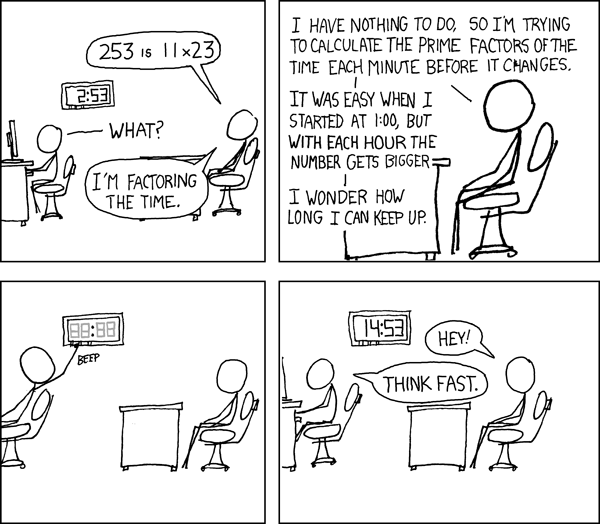Solution.
We present a solution that explains some of the “figuring” that might be useful in determining the prime factorization. Since 18810 ends in a 0, we automatically know that 10 is a factor, and we write
\begin{equation*}
18810=10\cdot 1881\text{.}
\end{equation*}
Now, 10 is definitely composite, so we can further break it down as \(10=2\cdot 5\) to get
\begin{equation*}
18810=2\cdot 5\cdot 1881\text{.}
\end{equation*}
It is less clear whether 1881 is prime or composite. Since 1881 is an odd number, it does not have a factor of 2. We move onto the next prime number, 3, and see if that is a factor of 1881. It turns out that it is.
A quick check to determine whether or not a number is divisible by 3 is to add up the digits of the number and determine whether or not that sum is divisible by 3. For the case of 1881, we have that
\(1+8+8+1=18\text{.}\) It is easier to see that the sum, 18, is divisible by 3. But if that is not obvious, we can continue to sum the digits to get that
\(1+8=9\text{,}\) which is clearly divisible by 3.
Since \(1881\) is divisible by \(3\text{,}\) we can compute that \(1881=3\cdot 627\text{.}\) We now have
\begin{equation*}
18810=2\cdot 5\cdot 3\cdot 627\text{.}
\end{equation*}
We can perform the same summing digits check mentioned above to determine that 627 is also divisible by 3. Since \(627=3\cdot 209\text{,}\) we now have
\begin{equation*}
18810=2\cdot 5\cdot 3\cdot 3\cdot 209\text{.}
\end{equation*}
Summing the digits of \(209\) tells us that 209 is not divisible by 3 since \(2+0+9=11\) is not divisible by 3. So, we move onto the next prime number, 5. Since 209 does not end in 0 or 5, we conclude that 5 is not a factor. We continue moving through the prime numbers and conclude that 7 is not a factor of 209 but that 11 is. Since \(209=11\cdot 19\text{,}\) we now have
\begin{equation*}
18810=2\cdot 5\cdot 3\cdot 3\cdot 11\cdot 19\text{.}
\end{equation*}
Since 19 is also a prime, we have now found all of the prime factors of 18810 and how many times they each occur. However, we typically rearrange the prime factors into non-decreasing order and use exponents to condense the prime factorization. Our final answer is
\begin{equation*}
18810=2\cdot 3^2\cdot 5\cdot 11\cdot 19\text{.}
\end{equation*}
